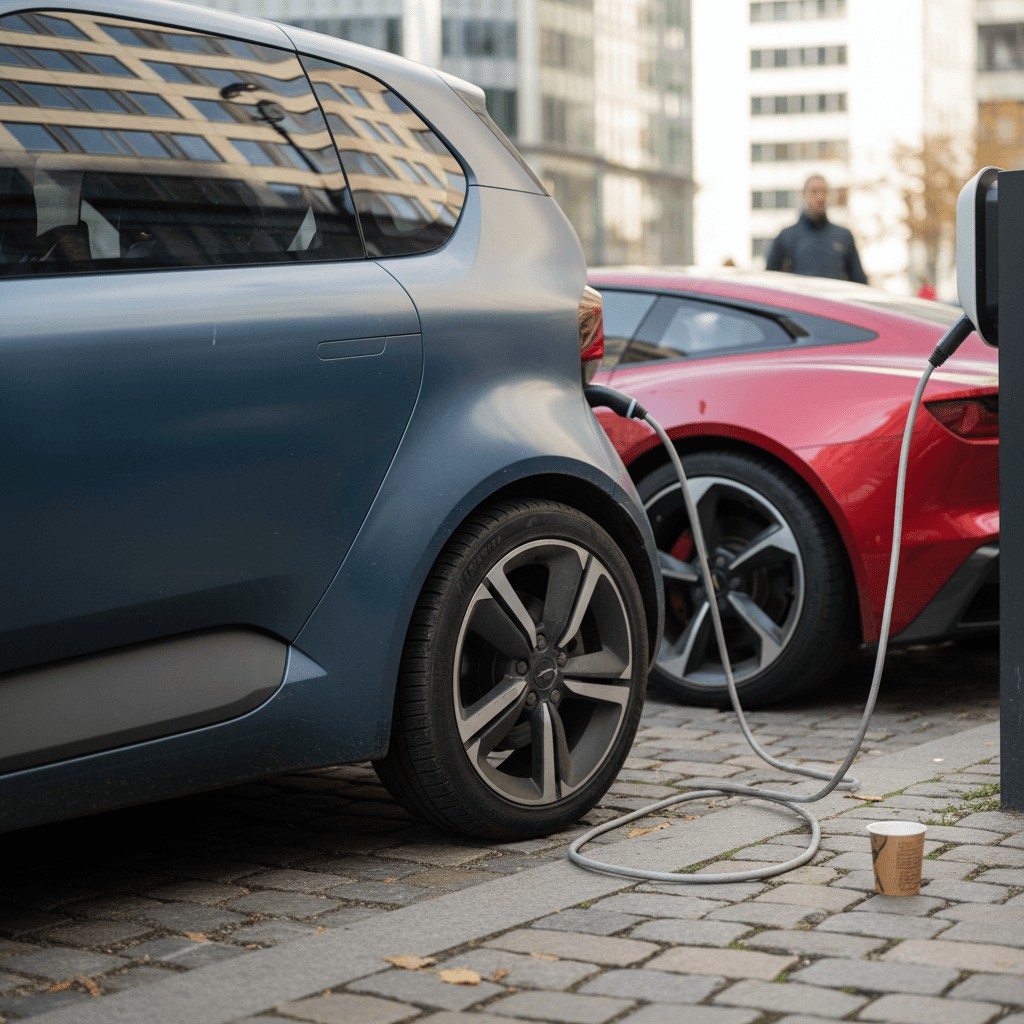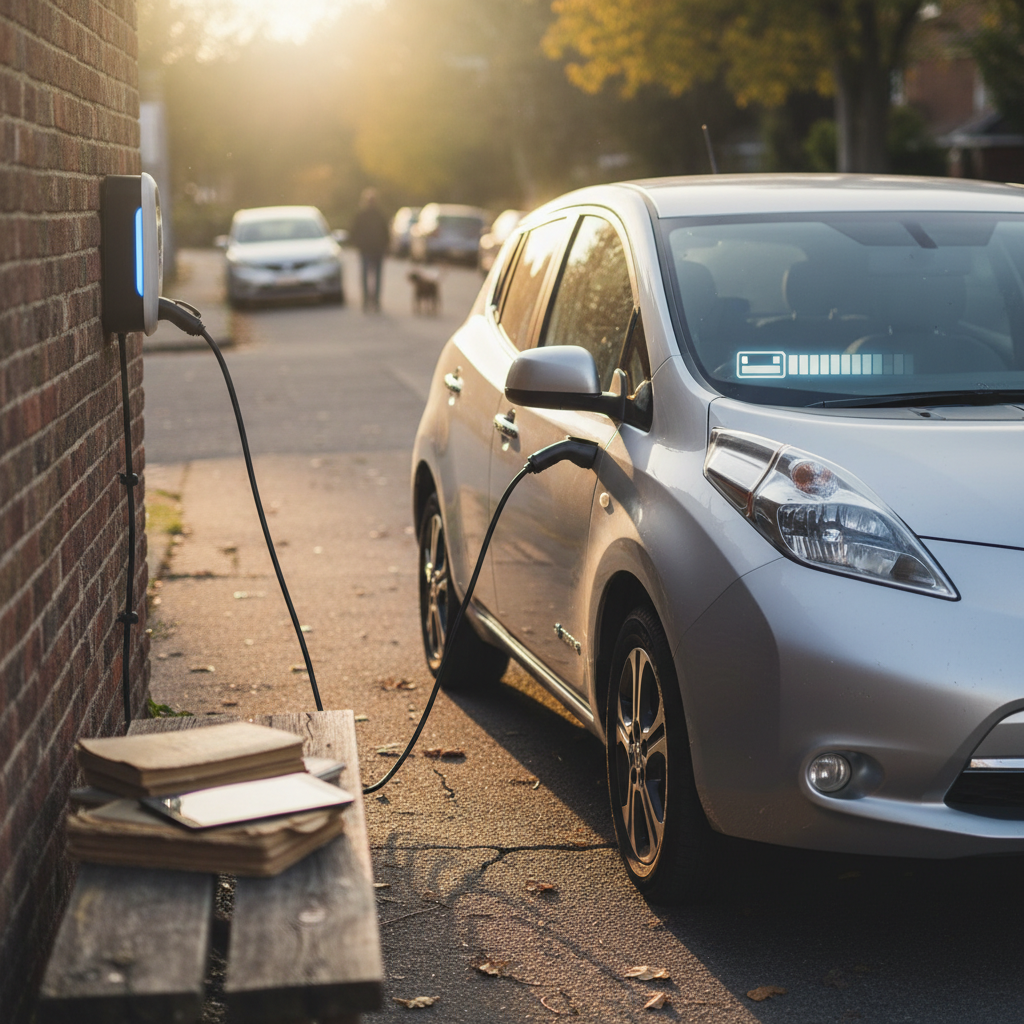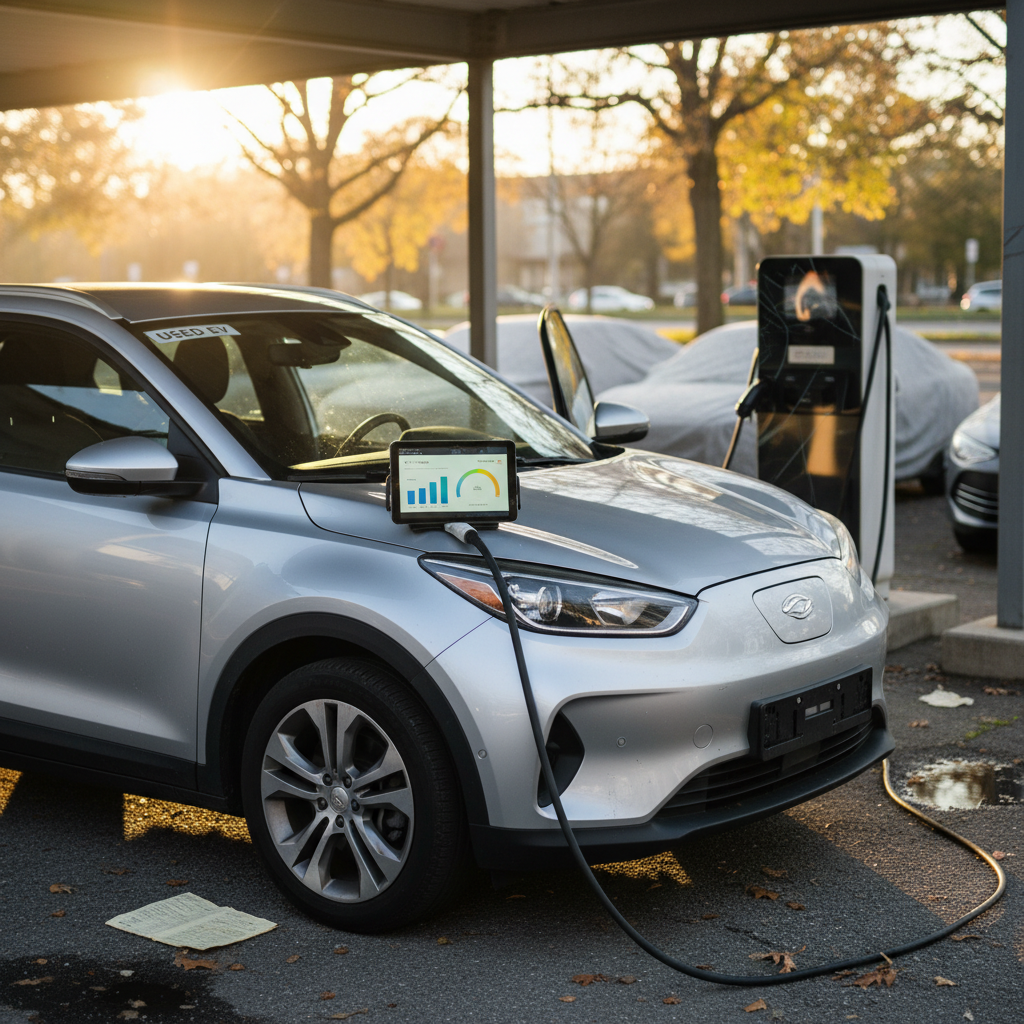If you’ve Googled “used cars enterprise”, you’re probably weighing Enterprise Car Sales against traditional dealers, online retailers, and maybe even your first used electric vehicle. Enterprise has quietly become one of the biggest used-car players in the U.S., but ex-rental cars come with their own set of tradeoffs. This guide breaks down how Enterprise Car Sales works in 2025, what you should watch for with former rental vehicles, and how that compares with buying a used EV from a specialized marketplace like Recharged.
Quick take
Why people search for “used cars enterprise”
Enterprise Car Sales has been around since the 1960s and now runs more than 100 locations across the U.S. Their model is simple: retire vehicles from the Enterprise rental and lease fleet, recondition them, and sell them as used cars with a branded Enterprise Certified inspection, no-haggle pricing, and a short return window. For shoppers, searching “used cars Enterprise” usually means one of three things:
- You’ve rented from Enterprise before and trust the brand more than a random used-car lot.
- You’ve heard ex-rental cars can be cheaper and want to know if the savings are worth it.
- You’re cross-shopping Enterprise’s gasoline cars with newer used EV options and want a clearer apples-to-apples comparison.
If you’re EV-curious, this is also the moment to decide whether you stick with a conventional gas car from Enterprise or look at a used EV with verified battery health from a retailer like Recharged. The math and the maintenance picture look very different for those two paths.
Why the used market matters in 2025
How Enterprise Car Sales works today
When you search for used cars at Enterprise, you’re mostly seeing vehicles that started life in the Enterprise rental or lease fleet. Here’s what that usually means for your buying experience:
Enterprise Car Sales basics
Key parts of the Enterprise value proposition
Fleet-based inventory
Enterprise Certified
Warranty & buyback
Enterprise’s pitch is that you avoid the pressure-cooker showroom experience. Pricing is no-haggle, and they’ll help with financing, trade-ins, and, in many cases, transferring a vehicle from another location if you don’t see what you want on-site.
Tip: Treat the 7-day window as a real test drive

Pros and cons of buying ex-rental cars
The biggest question behind any “used cars Enterprise” search is simple: Are former rental cars a smart buy? The answer depends on how you value price, history, and long-term ownership costs.
Upsides of ex-rental vehicles
- Transparent history: Major rental firms typically keep solid maintenance records and follow manufacturer service schedules.
- Newer model years: Fleet cars are usually just a few years old, so you may get newer safety tech than with a random older used car.
- Simplified pricing: No-haggle pricing means you know what you’ll pay at Enterprise, even if it’s not the absolute rock-bottom price in the market.
- Consumer-friendly policies: Short-term buyback and limited warranties provide a safety net many small lots don’t offer.
Downsides and risks
- High mileage for age: Rentals rack up miles quickly, especially airport and business-fleet units.
- Harder-driven life: Renters don’t always treat cars gently. Expect more wear on brakes, seats, and cosmetic surfaces than on a typical one-owner car.
- Limited choice: Fleet builds tend to be mid-trim, widely appealing configurations, not the rare spec or color you might want.
- Resale questions: Some buyers avoid ex-rentals, which can soften resale values compared with a clean, one-owner vehicle.
Don’t skip an independent inspection
Enterprise vs. traditional dealers and online retailers
Enterprise isn’t the only game in town for lightly used cars. Traditional franchised dealers, independent lots, and online-first retailers like CarMax or Carvana all compete for the same shoppers. Here’s how Enterprise typically stacks up on the fundamentals:
How Enterprise compares to other used-car channels
Key differences across common places you might shop
| Factor | Enterprise Car Sales | Franchised New-Car Dealer | Online Retailers (CarMax, etc.) |
|---|---|---|---|
| Pricing style | No-haggle, fleet-driven | Often negotiable, incentive-driven | No-haggle, algorithm-based |
| Inventory source | Mostly ex-rental or corporate fleet | Trade-ins, off-lease returns, auctions | Mixed: trade-ins, auctions, ex-fleet |
| Average mileage | Moderate to high for the age | Mixed, often lower for off-lease | Widely variable |
| Warranty included | 12 mo / 12k mi limited powertrain + roadside (typical) | CPO programs can exceed Enterprise; older cars may be as-is | Varies, often 90 days to limited multi-year |
| Return policy | 7 days / 1,000 miles with restocking fee | Rare beyond local goodwill | Often 7 days with no restocking fee |
| Shopping experience | Low-pressure, in-person plus online | Traditional showroom, more negotiation | Highly digital, minimal showroom time |
Use this table as a starting point, individual dealers can vary widely.
If you hate haggling and want a relatively predictable process, Enterprise looks a lot like the used-car side of modern online retailers. Where it differs is the heavy reliance on ex-rental inventory, which is either a non-issue for you or a dealbreaker, depending on your risk tolerance.
Where used EVs fit in your search
Five years ago, used EVs were a niche corner of the market. In 2025, they’re one of the fastest-growing segments thanks to lower prices, expiring leases, and a wave of new models. If you’re looking at used cars from Enterprise primarily to save money, a used EV – especially one with verified battery health – now deserves a serious look.

Why used EVs are suddenly competitive
Especially when you’re cross-shopping ex-rental gas cars
Lower running costs
Less wear and tear
Incentives and pricing
What about battery health?
Enterprise vs. Recharged for used EVs
Enterprise has begun listing more hybrids and electric vehicles alongside its gasoline inventory, but selling EVs isn’t its core business. Recharged, by contrast, exists specifically to make used EV ownership simple and transparent. If you’re EV-focused, here’s how the experience differs.
Buying a used EV from Enterprise
- Pros: Familiar brand, national footprint, simple return and warranty policies.
- Cons: EV inventory is limited and highly location-dependent. Battery health reporting may not go much deeper than a generic condition check and range estimate.
- Best for: Shoppers who are EV-curious but would buy a gas car if the right EV doesn’t show up on the lot.
Buying a used EV from Recharged
- Pros: Every vehicle includes a Recharged Score with verified battery diagnostics, fair-market pricing analysis, and a full digital shopping experience, plus expert EV specialists on call.
- Services: Financing, trade-in or instant offer, consignment options, and nationwide delivery, or visit our Experience Center in Richmond, VA if you want to see vehicles in person.
- Best for: Shoppers who want an EV-first experience and need clear data on battery health, charging suitability, and long-term ownership costs.
How many miles of battery life are left?
How to shop smart at Enterprise or any used lot
Whether you end up in an ex-rental sedan from Enterprise or a used EV from Recharged, the fundamentals of shopping smart are the same. You’re trying to reduce uncertainty about three things: history, current condition, and future costs.
Used-car due diligence checklist
1. Decode how the car was used
Ask explicitly whether the vehicle was a rental, corporate fleet car, rideshare unit, or personal lease. At Enterprise, assume fleet use unless told otherwise. For EVs, ask how the vehicle was charged day-to-day, mostly home L2, or frequent DC fast charging?
2. Scrutinize history reports
Review the CARFAX or similar history report for accidents, title issues, buybacks, and frequent auctions. For EVs, compare any reported battery or charging system repairs with independent diagnostics like the Recharged Score.
3. Match warranty to your mileage
Enterprise’s 12‑month/12,000‑mile powertrain coverage and 7‑day buyback may be enough if you drive modest miles. If you’re a high-mileage commuter, look carefully at extended service contracts or consider an EV with fewer mechanical failure points.
4. Budget for total cost of ownership
Don’t just compare sticker prices. Factor in fuel or electricity costs, maintenance, insurance, and expected depreciation. Used EVs can be more expensive up front but cheaper to run, especially if you charge at home.
5. Test drive like you own it
Drive on rough roads, highway on-ramps, and stop-and-go traffic. Listen for suspension clunks and transmission hiccups in gas cars; in EVs, cross-check real-world range with the dashboard estimate over a longer loop.
6. Leverage your return window
If you buy from Enterprise, schedule a third-party inspection during the 7‑day window. If you buy from Recharged, use the guidance from EV specialists to validate that the vehicle’s range and charging profile fits your real-world routes.
Avoid “as-is” surprises
FAQ: Common questions about used cars from Enterprise
Frequently asked questions
Bottom line: Are used cars from Enterprise right for you?
If you’re searching for used cars from Enterprise, you’re already looking beyond the traditional dealership playbook. Enterprise offers a cleaner experience, straightforward pricing, and real buyer protections, especially compared with small lots that sell as-is fleet cars with no safety net. The tradeoff is that many vehicles are ex-rentals, with more miles and a less personalized history than you might get from a one-owner car.
If you’ve decided a gasoline car is still your best fit, Enterprise can be a reasonable place to start, as long as you use that 7‑day window and do your homework on history and condition. But if you’re curious about owning an EV, and want clear, data-backed answers about battery health, range, and charging, a purpose-built marketplace like Recharged gives you a different level of transparency. You can browse used EVs online, review a Recharged Score for each vehicle, pre-qualify for financing, and get expert guidance from EV specialists who do this every day.
Either way, put the long-term numbers first: fuel or electricity costs, maintenance, warranties, and resale value. A well-chosen used EV with a healthy battery can undercut the total cost of many ex-rental gas cars, and Recharged is designed to help you find that match with confidence.



